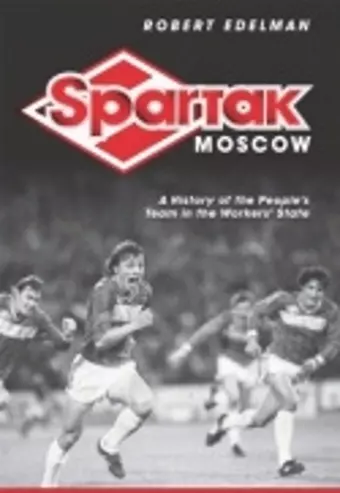Spartak Moscow
A History of the People's Team in the Workers' State
Format:Hardback
Publisher:Cornell University Press
Published:15th Nov '09
Currently unavailable, and unfortunately no date known when it will be back
This hardback is available in another edition too:
- Paperback£19.99(9780801478390)

In the informative, entertaining, and generously illustrated Spartak Moscow, a book that will be cheered by soccer fans worldwide, Robert Edelman finds in the stands and on the pitch keys to understanding everyday life under Stalin, Khrushchev, and their successors. Millions attended matches and obsessed about their favorite club, and their rowdiness on game day stood out as a moment of relative freedom in a society that championed conformity. This was particularly the case for the supporters of Spartak, which emerged from the rough proletarian Presnia district of Moscow and spent much of its history in fierce rivalry with Dinamo, the team of the secret police. To cheer for Spartak, Edelman shows, was a small and safe way of saying "no" to the fears and absurdities of high Stalinism; to understand Spartak is to understand how soccer explains Soviet life.
Champions of the Soviet Elite League twelve times and eleven-time winner of the USSR Cup, Spartak was founded and led for seven decades by the four Starostin brothers, the most visible of whom were Nikolai and Andrei. Brilliant players turned skilled entrepreneurs, they were flexible enough to constantly change their business model to accommodate the dramatic shifts in Soviet policy. Whether because of their own financial wheeling and dealing or Spartak's too frequent success against state-sponsored teams, they were arrested in 1942 and spent twelve years in the gulag. Instead of facing hard labor and likely death, they were spared the harshness of their places of exile when they were asked by local camp commandants to coach the prisoners' football teams. Returning from the camps after Stalin's death, they took back the reins of a club whose mystique as the "people's team" was only enhanced by its status as a victim of Stalinist tyranny.
Edelman covers the team from its days on the wild fields of prerevolutionary Russia through the post-Soviet period. Given its history, it was hardly surprising that Spartak adjusted quickly to the new, capitalist world of postsocialist Russia, going on to win the championship of the Russian Premier League nine times, the Russian Cup three times, and the CIS Commonwealth of Independent States Cup six times.
In addition to providing a fresh and authoritative history of Soviet society as seen through...
Edelman homes in on the most popular Soviet sport—soccer—and the sport's most popular team—Spartak Moscow. The author traces Spartak's story from its working-class origins in prerevolutionary Moscow to the post-Soviet 1990s, but this is more than the history of a soccer team; it shows the many ways in which soccer and politics were 'joined at the hip' and how the team's transformations mirrored and even influenced a constantly changing society. The book succeeds as a history of Spartak, written in accessible prose, for which sports-minded general readers and soccer fans worldwide should be grateful. Beyond team history, serious students of Soviet social and cultural history will benefit from Edelman's prodigious research.
* Library Journal *Fans of Spartak Moscow would have you believe that their club almost single-handedly defied the state machine.... Edelman's book is a heroic attempt to sift through the legend and arrive at... the truth.... With fascinating... descriptions of attending matches in 1930s Moscow... this is great work of research on a great club.
* When Saturday Comes *In Spartak Moscow, his new book about Russia's most illustrious soccer team, Robert Edelman tells some pretty funny stories about the ways in which Nikolai Starostin, long the man who ran Spartak, slipped and slid around the obstacles and dangers inherent in the country’s oppressive machinery by virtue of what he had to offer as a soccer coach.... Spartak’s colorful past provides Robert Edelman with plenty of tales of the team, the mere survival of which was testimony to the creativity of the man who ran it.
* Only a Game *Once in a while, a study appears that justifies including the history of sport among those topics that warrant serious scholarly attention. Robert Edelman has written such a work. This history of Spartak football club offers a superb blend of social, institutional, and cultural history alongside a thoroughly fascinating account of the development of what Edelman justly describes as Russia's most popular team.... It is a splendid piece of investigative research that could only have been compiled by someone thoroughly enthralled with his subject over many years. Combining archival study with personal interviews and reviews of journalistic accounts, Edelman has produced a book of scholarly substance that is readable and, at times, highly entertaining.
-- Robert F. Baumann * Europe-Asia Studies *Robert Edelman's densely informative Spartak Moscow is inevitably as much as the story of Nikolai Starostin as a history of the club whose legend he initiated and eventually epitomized.... Edelman earnestly addresses some perennial problems. How much genuine freedom of expression did the Soviet (male) citizen have, particularly under Stalin? Was supporting Spartak, with its inspirational, improvisatory style of play, a token of opposition-mindedness' Sensibly, Edelman gives qualified answers to this and many other big questions.... Edelman's account...finishes with an exemplary set of conclusions. To the end, Spartak Moscow manages to ride high, its legend as 'the people's club,' like the legacy of Starostin, faded but not forgotten.
* Times Literary Supplement *Spartak was not merely the most popular team in the USSR, but perhaps the most popular semiautonomous institution in the state: the 'people's team,' as Robert Edelman calls it in this revealing and often funny microhistory.
-- Simon Kuper * London Review of BooISBN: 9780801447426
Dimensions: 229mm x 149mm x 30mm
Weight: 907g
368 pages